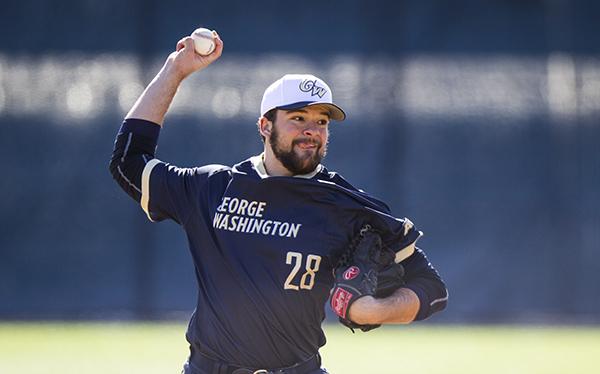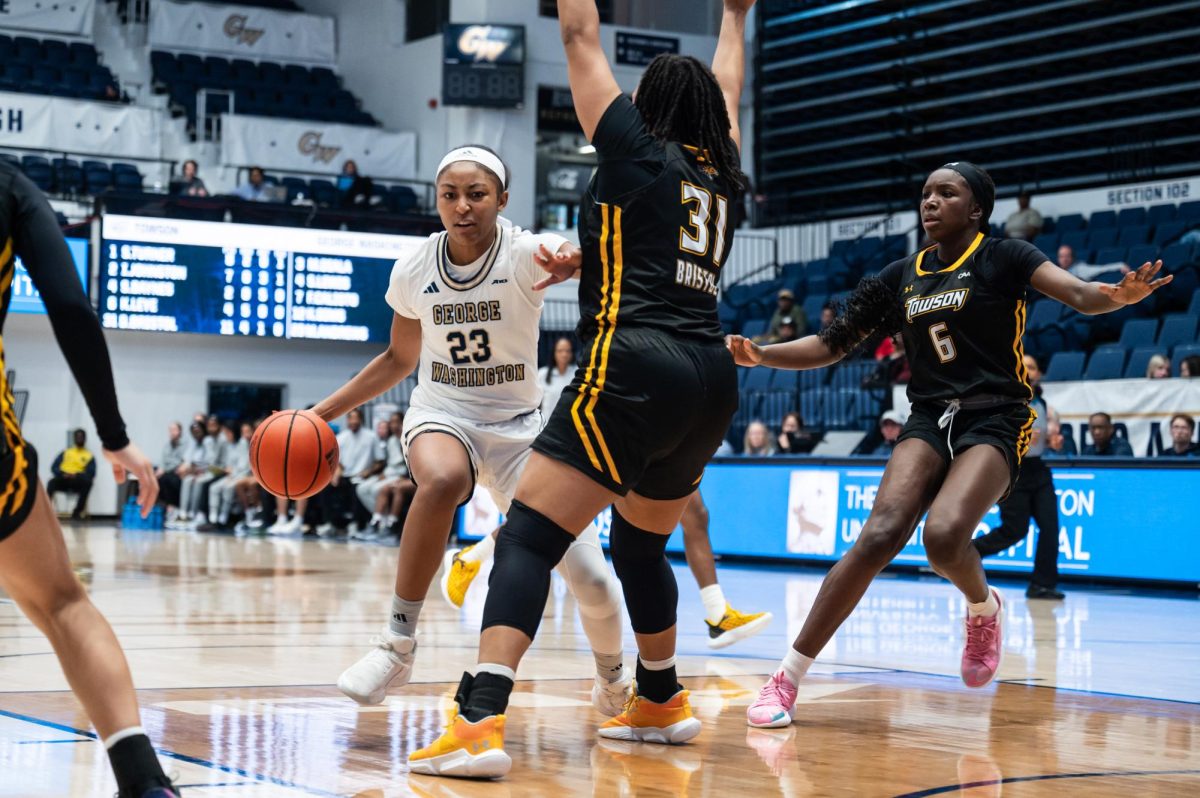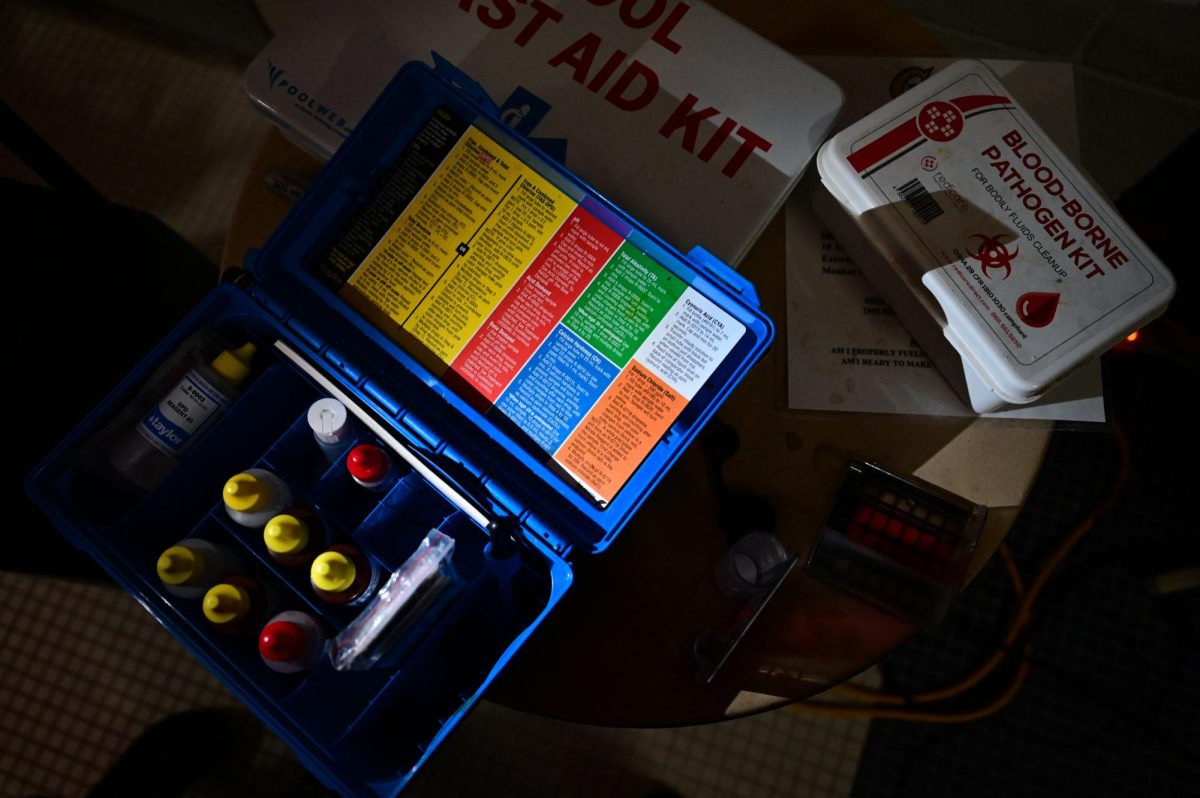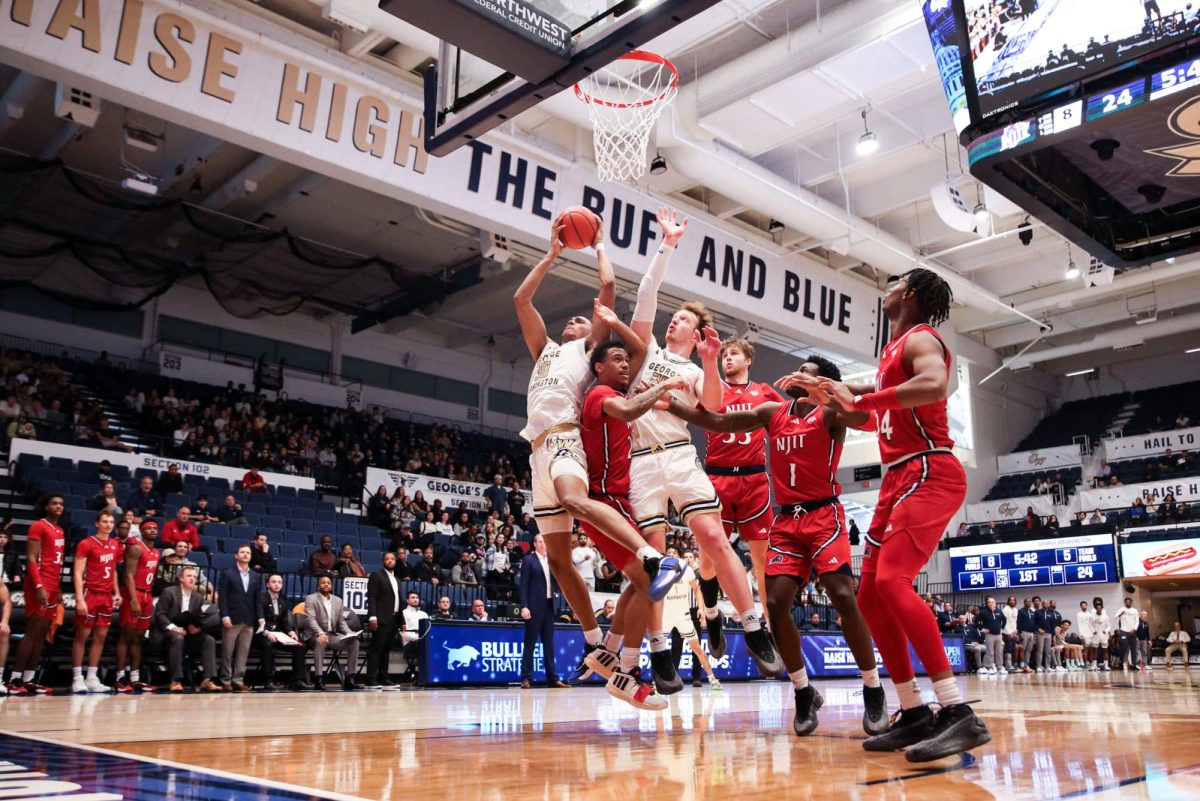The baseball gods have a cruel sense of humor.
Minutes after his father talked about his pinpoint precision, the opening-day starter of GW’s staff headed out to the mound, dug in and lost all control.
First pitch: strike. The next pitch, though, was catapulted 350 feet deep into the Colonial Corridor in center field, saved only by the center fielder who caught it with a leaping over-the-shoulder grab. The pitcher pointed to him in thanks as the ball whipped around the horn.
Then he missed on the first two pitches to the next batter. Then he hit him. And then he hit the batter after that, causing the infield to come in for a talk. A couple pitches later, he stepped off the rubber. The catcher jogged out to him, the pitching coach not far behind. They returned to their positions only to watch the next pitch get rocked again, this time off the left field wall to drive in the runner.
Runners stood on second and third with one out in the first inning on a relatively warm winter day at Barcroft Park. An Iowan – 1,030 miles away from his hometown just outside of Des Moines, where cornfields marked home run territory in right field during his Little League days – stood alone on the dirt mound in the middle of the state-of-the-art turf.
His teammates, and those who know him, call him Bobby the Bull. They call him a grinder.
He went with his signature pitch, the one his dad Steve LeWarne taught him: a circle changeup that the bottom falls out of. The batter took an awful swing, nearly dropping to his knees and getting behind in the count. He took a weak swing on the next pitch, chopping the ball back to the mound. Bobby the Bull stared down the runner at third and threw over to first, two outs. He threw another strike via the changeup to the following batter, who would pop up to center to end the inning.
Bobby LeWarne, a 6-foot-1, 190 pound right-handed pitcher in his third year at GW, didn’t have his best stuff against Niagara on Friday afternoon. He found a way to wiggle his way into the seventh inning, but was left with two men on base, both of whom would score. His final line was six plus innings with six runs, five earned and six hits, one walk and seven strikeouts – and the win.
“You want the Friday guy to give you a chance to win every single time he goes out,” head coach Gregg Ritchie said. “Even if he has a bad day, your offense needs to step up. If it’s not that, he’s shutting them down to one run. That’s what you’re looking for out of that guy.”
Two years ago, LeWarne was not that guy on a Friday in April. He came in relief in the seventh inning in what was a 4-2 game, trailing to Richmond. The first batter tripled, the next hit a home run down the left field line and the one after that hit a home run down the right field line. LeWarne lasted just one inning.
“It was obvious I needed to work harder. I needed to be more mature. I was a freshman. I was a little squirrelly. I got more mature and got more dedicated,” LeWarne said.
LeWarne said he learned to attack hitters more and “just have more fun” playing. He embraced the long-toss program and the lifting program, pitched in a competitive summer league and came back his sophomore year more disciplined.
Ritchie always projected LeWarne as a starter because he is a three-pitch pitcher – with a fastball, changeup and curveball – but was just waiting for LeWarne to get himself ready mentally.
“It was basically, ‘Here’s what’s in front of you, and here’s what you’re doing. Here are the results,’” Ritchie said. “‘Now, this has to happen. Either you’re going to do it, or you’re not.’ And to his credit, he basically grabbed it and said, ‘Ok, I’m ready to go.’ That’s just a maturity that just builds with experience.”
LeWarne moved into a starting role last season, going 2-5 with a 3.38 ERA and striking out 57. Twenty-nine of his 45 runs were earned in his 14 appearances, and his two wins came courtesy of complete games, one in which he threw 134 pitches in the nine innings, with seven strikeouts for the conference win over Rhode Island. The other was a shutout, a one-hitter against Monmouth.
In his two starts this season, LeWarne matched his win total from last year. He has a 3.46 ERA and is striking out a batter per inning.
Though the realization was complete only when Bobby was in high school, there were times back in his Amateur Athletic Union and Little League days when Steve LeWarne knew that his son could be a special pitcher.
“I’ll never forget it, and I still talk about it over beers. I’ve never seen a kid throw that many changeups in a ball game. They just couldn’t hit it,” he said. “That sticks out in my mind, when a kid’s throwing 90 percent of the game changeups. It’s like a knuckleballer.”
Steve LeWarne taught his son that changeup, telling him to throw that and not a breaking ball because he had hurt his own arm throwing too many breaking balls early in his career, which went as far as the college level. Steve LeWarne gave Bobby the nickname “Bull.”
“You wouldn’t know it now, but Bobby was not exactly a thin kid,” Steve LeWarne said. “He was kind of a bulldog. He was a little broad-shouldered, chubby.”
“Not only because of his size,” he added. “He just competed and was feisty and always wanted to have the ball in the big game. So that’s how we kind of gave him the name ‘Bull.’”
After playing third base on his father’s teams growing up, LeWarne flourished once he found himself on the mound in high school. But getting recruited wasn’t easy.
High school kids play baseball in the summer, but not the scout-preferred way. Instead of playing in big tournaments and camps, spring high school baseball starts at the end of the school year in Iowa Catholic school leagues and is played in front of big crowds through the summer.
But GW’s old pitching coach, Tim Brown, is an Iowa native. He saw Bobby play for his high school, Dowling Catholic. The connection was there, the interest was strong on both sides, but the question was whether LeWarne would head to the East Coast to play college baseball.
“We thought that was sort of a far-fetched deal, but once he got out there and met some of the guys, we thought this might be a good fit,” Steve LeWarne said. “Gosh, I’m real happy he made that move because he absolutely loves it out there. I don’t know if I’ll be able to get him back to Iowa.”
Now in his third year, studying biology as a pre-med student, LeWarne is starting to find his spot on the team. Starting on opening day is a nice nod, and LeWarne hopes to pitch in the pros one day – “Baseball every time. No question. No doubt. There’s only so many more years. You can go to med school whenever,” he said – but these days he is thinking about getting in his work for the day and getting ready to pitch the next Friday.
His freshman year is quickly looking like it’s miles in the past.
“Just be real, talking to each other man-to-man and coach-to-player and saying, ‘Hey look, this is what you have to do. If you don’t do this, you’ll be the same guy,’” Ritchie said. “‘There’s more in you, there’s a whole lot more still in you.’ There’s more in him now. There’s still more. We haven’t seen the best Bobby yet. If he goes another step.”







